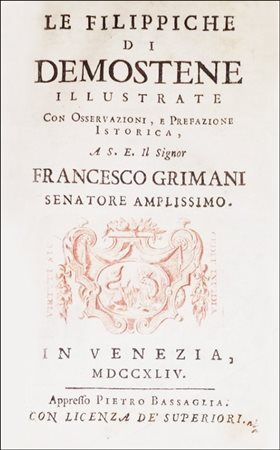 Bibliopathos - Via Enrico Toti 1, 37129 Verona
Bibliopathos - Via Enrico Toti 1, 37129 Verona
Medieval Notary Manuscripts & Law Books Sessione Unica - dal lotto 1 al lotto 280
Monday 28 December 2015 hours 17:00 (UTC +01:00)
DEMOSTHENES’ HARANGUES: THE ACME OF THE ART OF PERSUASIONTHE FRANCESCO...
DEMOSTHENES’ HARANGUES: THE ACME OF THE ART OF PERSUASION
THE FRANCESCO GUASTAVILLANI COPY
ONLY TWO COPIES IN USA
DEMOSTHENES. Le Filippiche di Demostene illustrate con Osservazioni, e Prefazione Istorica a S. E. il signor Francesco Grimani senatore amplissimo [...]. In Venezia, appresso Pietro Bassaglia, MDCCXLIV [Venice: Pietro Bassaglia, 1744].
A thick volume in-8vo (155x90 mm), contemporary stiff vellum, six raised bands with handwritten title at spine, sprinkled red edges pp. [32], 140, 485, [1, blank].
TWO ENGRAVINGS IN RED, THE FIRST ONE AT FRONTISPIECE, REPRESENTING THE COATS OF ARMS OF THE NOBLE VENETIAN FAMILY GRIMANI, AND THE OTHER ONE AT TITLE-PAGE WITH THE PRINTER’S DEVICE.
FINE VENETIAN EDITION OF DEMOSTHENES HARANGUES AGAINST PHILIP II OF MACEDON, THE ACME OF ANCIENT ART OF PERSUASION AND A SOURCE OF INSPIRATION FOR THE AUTHORS OF THE «FEDERALIST PAPERS» OF THE UNITED STATES CONSTITUTION.
This edition has a long historical preface about the History of Macedon.
DEMOSTHENES (384–322 BC), was a prominent Greek statesman and orator of ancient Athens. His orations constitute a significant expression of contemporary Athenian intellectual prowess and provide an insight into the politics and culture of ancient Greece during the 4th century BC.. He delivered his first judicial speeches at the age of 20, in which he argued effectively to gain from his guardians what was left of his inheritance. For a time, Demosthenes made his living as a professional speech-writer (logographer) and a lawyer, writing speeches for use in private legal suits.
He went on to devote his most productive years to opposing Macedon’s expansion. He idealized his city and strove throughout his life to restore Athens’ supremacy and motivate his compatriots against Philip II of Macedon. He sought to preserve his city’s freedom and to establish an alliance against Macedon, in an unsuccessful attempt to impede Philip’s plans to expand his influence southwards by conquering all the Greek states. After Philip’s death, Demosthenes played a leading part in his city’s uprising against the new King of Macedon, Alexander the Great. However, his efforts failed and the revolt was met with a harsh Macedonian reaction. To prevent a similar revolt against his own rule, Alexander’s successor in this region, Antipater, sent his men to track Demosthenes down. Demosthenes took his own life, in order to avoid being arrested by Archias, Antipater’s confidant.
The Alexandrian Canon compiled by Aristophanes of Byzantium and Aristarchus of Samothrace recognized Demosthenes as one of the ten greatest Attic orators and logographers. According to Longinus, Demosthenes «perfected to the utmost the tone of lofty speech, living passions, copiousness, readiness, speed». Cicero acclaimed him as «the perfect orator» who lacked nothing, and Quintilian extolled him as lex orandi («the standard of oratory») and that inter omnes unus excellat («he stands alone among all the orators»).




